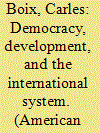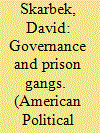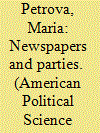|
|
|
Sort Order |
|
|
|
Items / Page
|
|
|
|
|
|
|
| Srl | Item |
| 1 |
ID:
110560


|
|
|
|
|
| Publication |
2011.
|
| Summary/Abstract |
How can one analyze collective action in protests or revolutions when individuals are uncertain about the relative payoffs of the status quo and revolution? We model a "calculus of protest" of individuals who must either submit to the status quo or support revolt based only on personal information about their payoffs. In deciding whether to revolt, the citizen must infer both the benefit of successful revolution and the likely actions of other citizens. We characterize conditions under which payoff uncertainty overturns conventional wisdom: (a) when a citizen is too willing to revolt, he reduces the incentives of others to revolt; (b) less accurate information about the value of revolution can make revolt more likely; (c) public signals from other citizens can reduce the likelihood of revolt; (d) harsher punishment can increase the incidence of punishment; and (e) the incidence of protest can be positively correlated with that of repression.
|
|
|
|
|
|
|
|
|
|
|
|
|
|
|
|
| 2 |
ID:
110559


|
|
|
|
|
| Publication |
2011.
|
| Summary/Abstract |
Resolving a controversy on the relationship of development to democratization, this article expands the time period under study with panel data running from the early nineteenth century (a time where hardly any country was democratic) to the end of the twentieth century, and shows a positive and significant effect of income on the likelihood of democratic transitions and democratic consolidations. The estimations hold after I control for country and time effects and instrument for income. Results reveal that the effect of income varies across income levels and across eras. First, income has a decreasing marginal effect on democratization. In already developed (and democratized) countries, any extra growth has no further effect on the level of democracy. Second, the structure of the international system affects the resources and strategies of pro-authoritarian and pro-democratic factions in client states. The proportion of liberal democracies peaks under international orders governed by democratic hegemons, such as the post-Cold War period, and bottoms out when authoritarian great powers such as the Holy Alliance control the world system.
|
|
|
|
|
|
|
|
|
|
|
|
|
|
|
|
| 3 |
ID:
110541


|
|
|
|
|
| Publication |
2011.
|
| Summary/Abstract |
An enduring concern about democracies is that citizens conform too readily to the policy views of elites in their own parties, even to the point of ignoring other information about the policies in question. This article presents two experiments that undermine this concern, at least under one important condition. People rarely possess even a modicum of information about policies; but when they do, their attitudes seem to be affected at least as much by that information as by cues from party elites. The experiments also measure the extent to which people think about policy. Contrary to many accounts, they suggest that party cues do not inhibit such thinking. This is not cause for unbridled optimism about citizens' ability to make good decisions, but it is reason to be more sanguine about their ability to use information about policy when they have it.
|
|
|
|
|
|
|
|
|
|
|
|
|
|
|
|
| 4 |
ID:
110551


|
|
|
|
|
| Publication |
2011.
|
| Summary/Abstract |
How do American Indian tribal governments relate to nearby local governments? Do insights gleaned from these cases illuminate the constraints and opportunities that marginalized groups face within any system of federalism? What circumstances of marginalized governments help or hinder their effectiveness? Although some Native American tribes have transformed their fortunes with highly profitable casinos, most continue to face stark disadvantages. Some tribal governments, despite limited opportunities prevail locally by cultivating policy and political expertise. This analysis demonstrates that such expertise can be developed, even when resources are scarce.
|
|
|
|
|
|
|
|
|
|
|
|
|
|
|
|
| 5 |
ID:
110556


|
|
|
|
|
| Publication |
2011.
|
| Summary/Abstract |
Addressing historic injustice involves a struggle against absence. This article reflects on the foundations of that challenge, on absence and justice. I ask what it means to address the absent victims of deadly injustice given the distance of time and death that separates us from them. This topic embraces a wide swath of events of interest to students of politics. Some are as recent as the Rwandan genocide; others are by now historical: the Holocaust or slavery in antebellum America. All have in common that they and their victims are distant from us, a separation that makes doing them justice deeply perplexing. In response, I sketch an argument that the absent victims of injustice are not nullities but retain a status, a presence as claimants on justice that defines our efforts to address the wrongs done them.
|
|
|
|
|
|
|
|
|
|
|
|
|
|
|
|
| 6 |
ID:
110553


|
|
|
|
|
| Publication |
2011.
|
| Summary/Abstract |
How can people who lack access to effective government institutions establish property rights and facilitate exchange? The illegal narcotics trade in Los Angeles has flourished despite its inability to rely on state-based formal institutions of governance. An alternative system of governance has emerged from an unexpected source-behind bars. The Mexican Mafia prison gang can extort drug dealers on the street because they wield substantial control over inmates in the county jail system and because drug dealers anticipate future incarceration. The gang's ability to extract resources creates incentives for them to provide governance institutions that mitigate market failures among Hispanic drug-dealing street gangs, including enforcing deals, protecting property rights, and adjudicating disputes. Evidence collected from federal indictments and other legal documents related to the Mexican Mafia prison gang and numerous street gangs supports this claim.
|
|
|
|
|
|
|
|
|
|
|
|
|
|
|
|
| 7 |
ID:
110558


|
|
|
|
|
| Publication |
2011.
|
| Summary/Abstract |
Media freedom strongly inhibits corruption and promotes good governance, but what leads to media freedom? Do economic development and higher advertising revenues tend to make media outlets independent of political groups' influence? Using data on nineteenth-century American newspapers, I show that places with higher advertising revenues were likelier to have newspapers that were independent of political parties. Similar results hold when local advertising rates are instrumented by regulations on outdoor advertising and newspaper distribution. In addition, newly created newspapers were more likely to enter the market as independents in places with higher advertising rates. I also exploit the precise timing of major changes in advertising rates to identify how advertising revenues affected the entry of new newspapers. Finally, I demonstrate that economic development, and concomitant higher advertising revenue, is not the only reason that an independent press expands; political factors also played a role.
|
|
|
|
|
|
|
|
|
|
|
|
|
|
|
|
| 8 |
ID:
110554


|
|
|
|
|
| Publication |
2011.
|
| Summary/Abstract |
When can presidents direct bureaucrats to allocate government expenditures for electoral purposes? To address this question, I exploit a scandal concerning the General Services Administration (GSA), an agency that contracts with private vendors to provide supplies and real estate to other agencies. Shortly after Republican losses in 2006, a White House deputy gave a presentation to GSA political appointees identifying potentially vulnerable congressional districts. I find that vendors in prioritized Republican districts experienced unusually large new contract actions from the GSA's Public Buildings Service following the presentation relative to unmentioned districts, a discrepancy that disappeared once the Washington Post broke the story. Contracts supervised by the agency's Federal Acquisition Service, by contrast, were largely unresponsive to the briefing and media scrutiny. My findings suggest that the extent to which executives succeed in politicizing discretionary allocation decisions depends upon key features of the implementing agency's tasks and its informational environment.
|
|
|
|
|
|
|
|
|
|
|
|
|
|
|
|
| 9 |
ID:
110555


|
|
|
|
|
| Publication |
2011.
|
| Summary/Abstract |
Persuaded by the critique of cultural essentialism, many critics believe that there is no defensible way of identifying distinct cultures, or of distinguishing cultural loss from cultural change, that is compatible with the normative agenda of multiculturalism. This article challenges this widely shared belief by developing a concept of culture that can withstand the critique of essentialism and support the positive claims of multiculturalists. Culture, in the view developed here, is what people share when they have shared subjection to a common formative context. A division of the world, or of particular societies, into distinct cultures is a recognition that distinct processes of socialization operate on different groups of people. Because culture in this view is the precipitate of a common social lineage, the view is called the "social lineage account" of culture.
|
|
|
|
|
|
|
|
|
|
|
|
|
|
|
|
| 10 |
ID:
110550


|
|
|
|
|
| Publication |
2011.
|
| Summary/Abstract |
Policymaking is hard. Policymakers typically have imperfect information about which policies produce which outcomes, and they are left with little choice but to fumble their way through the policy space via a trial-and-error process. This raises a question at the heart of democracy: Do democratic systems identify good policies? To answer this question I introduce a novel model of policymaking in complex environments. I show that good policies are often but not always found and I identify the possibility of policymaking getting stuck at outcomes that are arbitrarily bad. Notably, policy stickiness occurs in the model even in the absence of institutional constraints. This raises the question of how institutions and the political environment impact experimentation and learning. I show how a simple political friction-uncertainty over voter preferences-interacts with political competition and policy uncertainty in a subtle way that, surprisingly, improves the quality of policymaking over time.
|
|
|
|
|
|
|
|
|
|
|
|
|
|
|
|
| 11 |
ID:
110557


|
|
|
|
|
| Publication |
2011.
|
| Summary/Abstract |
Identifying causal mechanisms is a fundamental goal of social science. Researchers seek to study not only whether one variable affects another but also how such a causal relationship arises. Yet commonly used statistical methods for identifying causal mechanisms rely upon untestable assumptions and are often inappropriate even under those assumptions. Randomizing treatment and intermediate variables is also insufficient. Despite these difficulties, the study of causal mechanisms is too important to abandon. We make three contributions to improve research on causal mechanisms. First, we present a minimum set of assumptions required under standard designs of experimental and observational studies and develop a general algorithm for estimating causal mediation effects. Second, we provide a method for assessing the sensitivity of conclusions to potential violations of a key assumption. Third, we offer alternative research designs for identifying causal mechanisms under weaker assumptions. The proposed approach is illustrated using media framing experiments and incumbency advantage studies.
|
|
|
|
|
|
|
|
|
|
|
|
|
|
|
|
| 12 |
ID:
110552


|
|
|
|
|
| Publication |
2011.
|
| Summary/Abstract |
Democracy is about including those who are potentially affected by collective decisions in making those decisions. For this reason, contemporary democratic theory primarily assumes membership combined with effective voice. An alternative to voice is exit: Dissatisfied members may choose to leave a group rather than voice their displeasure. Rights and capacities for exit can function as low-cost, effective empowerments, particularly for those without voice. But because contemporary democratic theory often dismisses exit as appropriate only for economic markets, the democratic potentials of exit have rarely been theorized. Exit-based empowerments should be as central to the design and integrity of democracy as distributions of votes and voice, long considered its key structural features. When they are integrated into other democratic devices, exit-based empowerments should generate and widely distribute usable powers for those who need them most, evoke responsiveness from elites, induce voice, discipline monopoly, and underwrite vibrant and pluralistic societies.
|
|
|
|
|
|
|
|
|
|
|
|
|
|
|
|
|
|
|
|
|